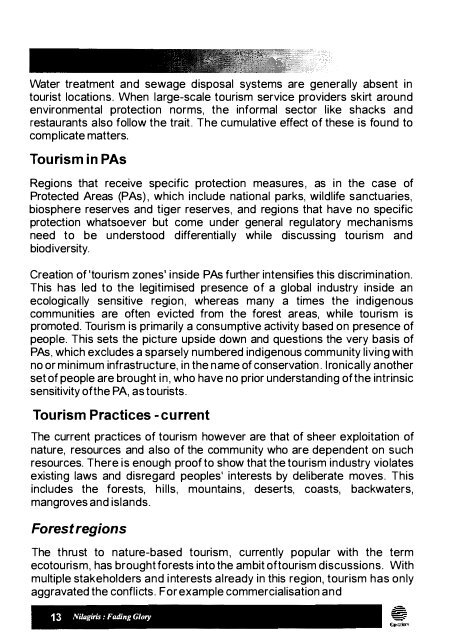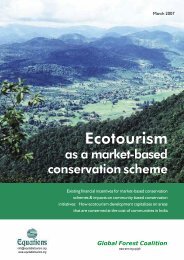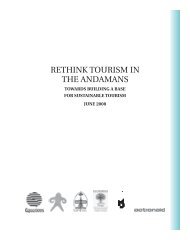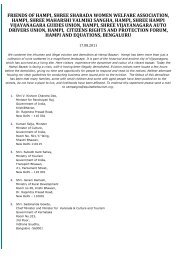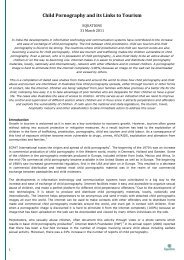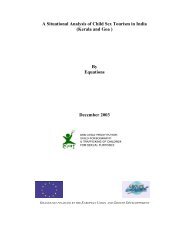Nilgiris Biosphere Reserve - Equitable Tourism Options
Nilgiris Biosphere Reserve - Equitable Tourism Options
Nilgiris Biosphere Reserve - Equitable Tourism Options
You also want an ePaper? Increase the reach of your titles
YUMPU automatically turns print PDFs into web optimized ePapers that Google loves.
Water treatment and sewage disposal systems are generally absent in<br />
tourist locations. When large-scale tourism service providers skirt around<br />
environmental protection norms, the informal sector like shacks and<br />
restaurants also follow the trait. The cumulative effect of these is found to<br />
complicate matters.<br />
<strong>Tourism</strong> in PAs<br />
Regions that receive specific protection measures, as in the case of<br />
Protected Areas (PAs), which include national parks, wildlife sanctuaries,<br />
biosphere reserves and tiger reserves, and regions that have no specific<br />
protection whatsoever but come under general regulatory mechanisms<br />
need to be understood differentially while discussing tourism and<br />
biodiversity.<br />
Creation of 'tourism zones' inside PAs further intensifies this discrimination.<br />
This has led to the legitimised presence of a global industry inside an<br />
ecologically sensitive region, whereas many a times the indigenous<br />
communities are often evicted from the forest areas, while tourism is<br />
promoted. <strong>Tourism</strong> is primarily a consumptive activity based on presence of<br />
people. This sets the picture upside down and questions the very basis of<br />
PAs, which excludes a sparsely numbered indigenous community living with<br />
no or minimum infrastructure, in the name of conservation. Ironically another<br />
set of people are brought in, who have no prior understanding of the intrinsic<br />
sensitivity ofthe PA, as tourists.<br />
<strong>Tourism</strong> Practices - current<br />
The current practices of tourism however are that of sheer exploitation of<br />
nature, resources and also of the community who are dependent on such<br />
resources. There is enough proof to show that the tourism industry violates<br />
existing laws and disregard peoples' interests by deliberate moves. This<br />
includes the forests, hills, mountains, deserts, coasts, backwaters,<br />
mangroves and islands.<br />
Forest regions<br />
The thrust to nature-based tourism, currently popular with the term<br />
ecotourism, has brought forests into the ambit oftourism discussions. With<br />
multiple stakeholders and interests already in this region, tourism has only<br />
aggravated the conflicts. Forexample commercialisation and<br />
13 Nilagiris : Fading Glory


